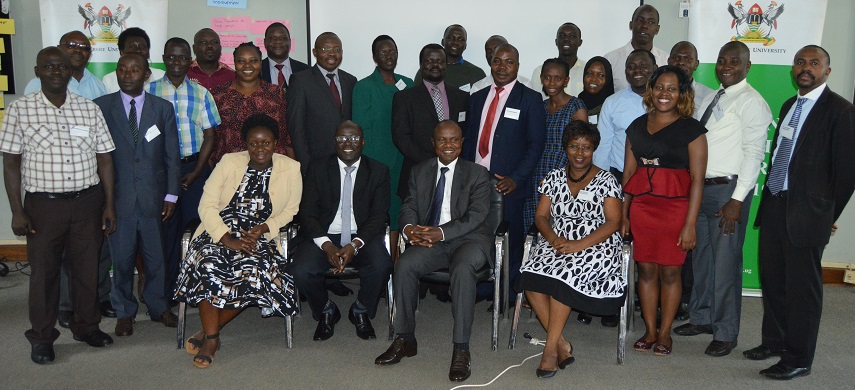The Vice Chancellor of Makerere University, Prof. Barnabas Nawangwe has urged lecturers to observe the professional ethics in their line of duty. This was during the official opening of the Pedagogical Skills Training for Assistant Lecturers on 23rd July 2018 at Makerere University Telepresence Centre. The Pedagogical Skills training, was organised by the Directorate of Human Resources together with the College of Education and External Studies to equip Makerere University Assistant Lecturers with skills and techniques that will enhance their teaching ability and improve the quality of teaching at Makerere University.
The training was geared towards sensitizing the Assistant Lecturers on how to generally share ideals of Makerere University and advance the students and customer experience through improved teaching and learning.

According to the Director of Human Resources Mr. Andrew Abunyang, the training that officially started on 23rd July 2018 will end in March 2019 with more than 300 participants trained. “We have restructured this training in a way that, we shall have a session every after two weeks. In each session we expect 35 participants from the selected Colleges to undertake the training for three days,” he explained.
35 Assistant Lecturers from the College of Natural Sciences, College of Business and Management Sciences and College of Computing and Information Sciences are participating in the first session of the Pedagogical Skills Training that is running from 23rd-25th July 2018.
“Pedagogical Skills Training is so special and it impacts competence among people. We all know that universities are regarded as engines of growth in a country. Those who teach, are supposed to efficiently do the work. Remember, we are expected to spur development,” said Dr. David Onen, a Coordinator, at the East African School of Higher Education Studies and Development.

In a speech read by the Principal of the College of Business and Management Sciences Dr. Eria Hisali, the Vice Chancellor thanked the Directorate of Human Resources for taking the lead in the Pedagogical Skills Training workshop.
“I am impressed that you have worked had to deliver the training. It is my hope that you will create time to discuss the possibilities of how to mainstream students’ mentoring in our activities. I hope this will form the basis for annual refresher training and capacity building on selected pertinent areas to continuously improve our performance,” he said.
He urged participants to take the Pedagogical Skills Training seriously and encouraged them to put into practice what they would have learnt during the three days training. He challenged participants to build strong networks that will inform future collaborations in areas such as joint supervisions of dissertation, research and grant proposal development.
“I want to remind you that Makerere University belongs to all of us and we will be happy to receive feedback through the workshop evaluation that you should undertake to give us baseline data for future interventions,” said the Vice Chancellor.

Representing Prof. Fred Masagazi Masaazi, the Principal of the College of Education and External Studies, the Deputy Principal, Dr. Paul Birevu Muyinda thanked the Directorate of Human Resources for ensuring that Lecturers receive a skill that will help them perform their tasks professionally.
Reiterating the importance of the training, the Dean of the East African School of Higher Education Studies and Development Dr. Ronald Bisaso urged all lecturers and teachers to undertake the Pedagogical Skills Training. “knowing something and passing on the knowledge to someone are two different things. You will always need to be trained on how to properly and efficiently pass on that knowledge to the intended person.”
Some of the topics to be discussed during the three days training include;
- Higher education (its environment and dynamics)
- Learning theories, style and changing philosophy of learning
- Learning goals and learning outcomes
- Pedagogical Design
- Assessment of and information learning
- Student support
Article by; Racheal Kanyi, Volunteer- Mak Public Relations Office

 General2 weeks ago
General2 weeks ago
 Natural Sciences2 weeks ago
Natural Sciences2 weeks ago
 Agriculture & Environment1 week ago
Agriculture & Environment1 week ago
 Health2 weeks ago
Health2 weeks ago
 General5 days ago
General5 days ago






